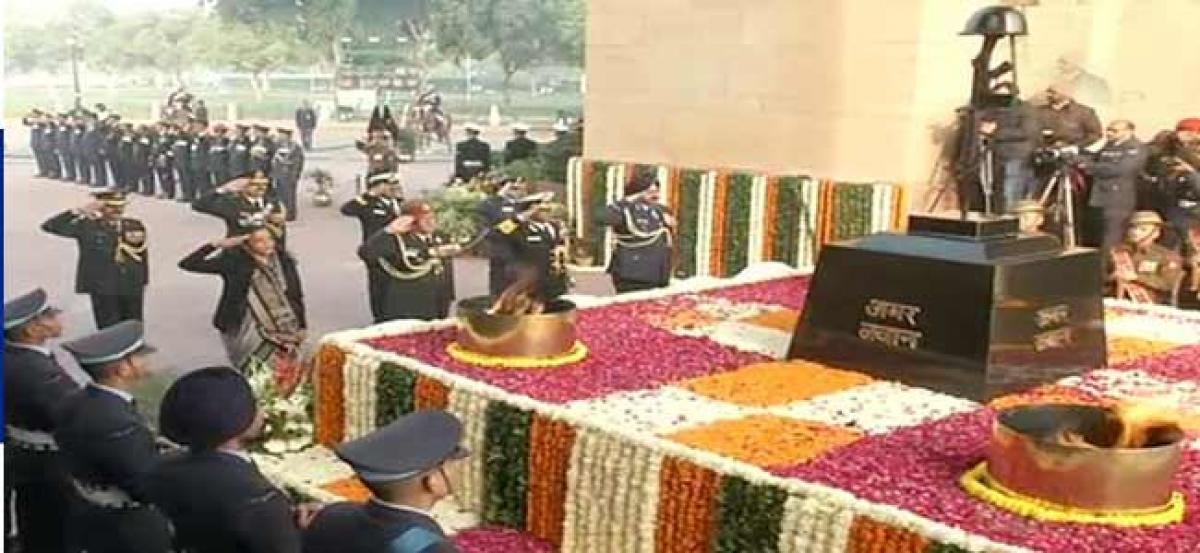Live
- Mahindra University signs MoU on sustainability practices
- Dr Lakshmi puts off campaign to save mother and child
- Violence mars polls in Manipur
- Israeli missile hits Iran
- Women voters become a deciding factor in Nellore
- Congress eyes opening of account in Prakasam
- World’s highest polling station in HP has 52 voters
- Zero voter turnout in 6 Nagaland dists
- PM takes ‘atta’ dig at Pakistan
- Cong outdated: Rajnath
Just In

On the occasion of Vijay Diwas, Defence Minister Nirmala Sitharaman, Army Chief General Bipin Rawat, Chief of Naval Staff Admiral Sunil Lanba and Chief of Air Staff Air Chief Marshal Birender Singh Dhanoa paid tributes to soldiers who lost their lives in 1971 Indo-Pak war at India Gate in the national capital today.
New Delhi: On the occasion of Vijay Diwas, Defence Minister Nirmala Sitharaman, Army Chief General Bipin Rawat, Chief of Naval Staff Admiral Sunil Lanba and Chief of Air Staff Air Chief Marshal Birender Singh Dhanoa paid tributes to soldiers who lost their lives in 1971 Indo-Pak war at India Gate in the national capital today.
Meanwhile, the Indian Army paid tributes to soldiers at Army Garrison Ground in Mumbai's Colaba earlier in the day.
The Indo-Pakistan War of 1971 is heralded as one of the most convincing victories of the annals of the military history.
It culminated with the abject surrender of Pakistani forces in East Pakistan (now, Bangladesh), with almost 1,00,000 being taken prisoners of war (PoWs), and eventually leading up to the liberation of Bangladesh on December 16.
India and Bangladesh, since then, celebrate Vijay Diwas, also known as the Victory Day, every year to mark both the countries' military victory over Pakistan.
Lt. Gen. PS Mehta had said, "The Indian Defence Forces celebrate Vijay Diwas on December 16 to remember the day of the 1971 war between India and Pakistan. On December 3, Pakistan attacked 11 of the Indian air fields because of which the war actually started. In response, India did take offensive undertaking in Eastern and Western areas of Pakistan. This Vijay Diwas is celebrated because in just 13 days, Indian forces, which included the Air Force, Para Troopers, Ground Force and Navy, made Dhaka independent."
He added that after this day, the birth of a new nation took place, which is now known as Bangladesh and this was the first time, in the 21st century, where India showed the whole world that it liberated a new country.
Another veteran and defence and security expert said, "The war was a result of genocide by the Pakistani Army in erstwhile East Pakistan which led to the influx of lakhs of refugees into India and creation of a humanitarian crisis. Indira Gandhi, then Prime Minister of India, made many attempts to galvanise international action against Pakistan and support to India to look after the refugees, but it did not come by."
On ground, the Indian forces in East Pakistan relentlessly marched forward despite the enemy strength of about four divisions and established complete supremacy which ultimately led to the Pakistani forces laying down their arms.
Pakistan's combat strength in East Pakistan by the end of November 1971 was four divisions.
In addition, there were 25,000 irregulars, one regiment plus a squadron of Chaffee tanks, an ad hoc squadron of Chaffee and PT 76 tanks.
Its Air Force had 25 Sabre jets and a few helicopters. The Pakistan Navy had sufficient gunboats operating in inland and coastal waters. However, not a single aircraft was destroyed on ground.
The Indian Air Force went into action the same night and continued operations at an unprecedented pace of 500 sorties per day, a rate higher than in the Second World War.
Pakistan then strategised annexing of some territories in the deserts as that could play out as assets on the negotiating table.
This led to the epic Battle of Longewala where an Infantry company of 23 Punjab under Major (later Brigadier) KS Chandpuri withstood an assault by hundreds of tanks throughout the night. The Pakistan Tanks were decimated the next morning by the Indian Air Force, the defence expert concludes.

© 2024 Hyderabad Media House Limited/The Hans India. All rights reserved. Powered by hocalwire.com







